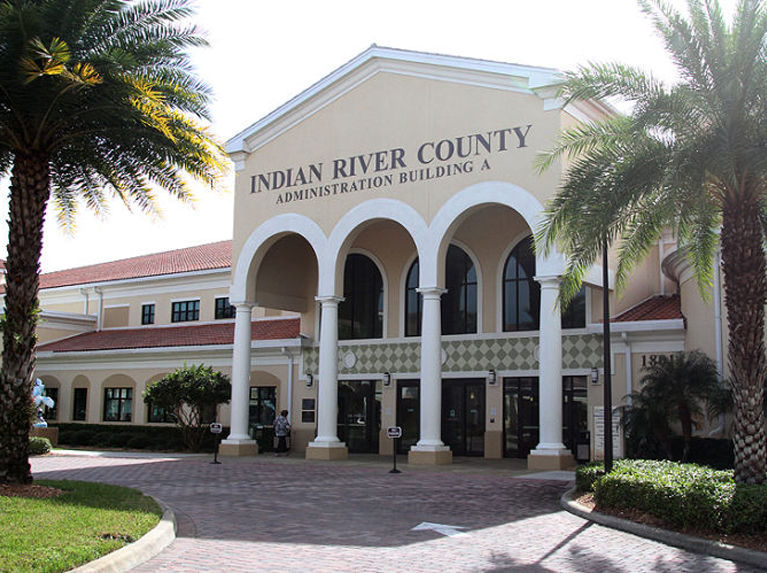
WABASSO — A nearly 20-acre heavy-commercial development, shrouded in mystery, may be going up next to two residential developments in the Wabasso Corridor, which north-south axis runs between 95th Street and 77th Street along U.S. 1.
On Tuesday, the Indian River County Commission, seeing the number of residents who wanted to speak, held a public hearing of sorts, but the whole proceeding was “tabled,” and “continued” and “deferred” after hours of discussion.
The application had been denied by the county’s planning commission on Jan. 14, and the commissioners were to rule on the appeal after making findings of fact based on evidence and testimony.
The Indian River County planning staff recommended 15 acres be rezoned to heavy commercial with a 30-foot wide landscape buffer and a six-foot “opaque” fence separating it from an adjacent RV park that’s been there since the mid-1970s.
The unknown industry site would also be about 900 feet from the closest home in the Hobart Landing residential community across the highway, according to the Bob Greason, vice president of the homeowner’s association.
About 60 residents came to the meeting, mostly from the seniors-only Palm Paradise Mobile Home & RV Park, many wearing bright green T-Shirts that said “No CH,” meaning no heavy-commercial zoning.
MPM Seven, a limited partnership set up Jan. 21, represented by Robert McKinley, is authorized to purchase several parcels to make up the nearly 20-acre development. The land is located north of 77th Street, between Old Dixie Highway and U.S. 1, which is the southern end of the Wabasso Corridor.
About five of the acres are already zoned heavy commercial, but about 12 acres are zoned light commercial and about three acres are zoned for a mobile home park, on which Palm Paradise sits.
MPM Seven applied to change the light commercial and mobile-home park’s collective 15 acres to heavy commercial, which was denied by the county planning and zoning commission.
The owner of Palm Paradise, Bill Brehm, showed up with a land-use attorney, Warren Dill, who objected to the lack of due process three times during the hearing.
“I am almost speechless,” Dill said, after McKinley was allowed to change his application on appeal from the planning commission and then to verbally offer to make further “unenforceable” deals at Tuesday’s hearing. The amended application tries to assuage Palm Paradise residents by zoning its three acres as light commercial instead of heavy commercial.
Dill pointed out how expensive the hearing was for Brehm. He paid for an expert witness on land use, a court recorder and his own legal services in preparation for the hearing, based on the application, not on-the-wing negotiations.
“Now you’re saying let me see the other side’s case and then I’ll see what I’m going to do,” Dill said.
Contract zoning procedure, said Dill, requires that deed restrictions be worked out before the public hearing to be enforceable. The current land owners, “and there are several, would have to sign off on it,” he said. McKinley had made no effort to contact the residents or Brehm, Dill said, to discuss what deed restrictions might be necessary to appease residents.
Commissioner Bob Solari agreed that the board should not be negotiating differences among the parties.
The commissioners agreed to table the decision on the zone change, but agreed to let residents give testimony. They said another public hearing will be held April 5.
Dill pointed out that tabling should and normally takes the whole item off the table.
Several residents spoke, complaining that they already are bothered by noise from vehicles operating at the waste management plant, located at what was the old Kennedy packing house, farther away than the proposed development. They extolled the beauty of both residential developments and their desire they remain quiet and peaceful. Noise pollution and air-borne toxins were also mentioned.
Greason disagreed with the county planning staff’s assessment that the zone change would be in conformance with the Wabasso Corridor plan, adopted in 2000.
He read phrases from the plan, such as, “maintain the integrity of the community,” and “enhance the appearance of the Wabasso Corridor,” and “increase property values,” which heavy commercial use would work against, he said.
“Again I want to rebut that commercial-heavy use falls within the intent of the corridor. It is the gateway to our beaches,” Greason said, and seen by 25,000 vehicles a day that travel the corridor.
Another resident pointed out Vero Beach’s growth is primarily based on tourism, not industry.
A few residents said they wouldn’t be able to attend the second public hearing on April 5, since they’re snowbirds, heading north after Easter.
McKinley, at the end of the hearing, said he would make himself available to the residents and Brehm’s legal counsel over the next month, perhaps working out deed restrictions that would be determined by the next hearing.



